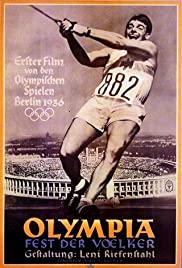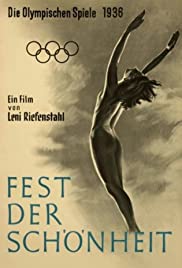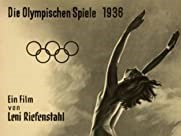Olympia ***** (1938, dir Leni Riefenstahl) – Classic Movie Review 9771
Writer-producer-director Leni Riefenstahl’s 1938 documentary film Olympia [Die Olympischen Spiele] [Olympiad] is an unhealthy paean to the Nazi belief in the power of the body beautiful and the rigours of the outdoor lifestyle, which is particularly scary when you see the results set among all the swastikas and being presided over by a smug-looking Hitler, acting like a kind of new wave Roman emperor.
Thirty cameramen (led by Hans Ertl) using planes and airships were employed to shoot this insidiously beautiful, technically brilliant, but ideologically unsound documentary of the 1936 Berlin Olympics, which draws specious parallels between Nazism and Greek classicism. In short, it is the documentary film orchestrated as Nazi propaganda, with the Nazis gleefully corrupting the Olympic spirit for their own evil ends.
Riefenstahl’s defence no doubt was that she was commissioned by the 1936 International Olympic Committee and was shooting a poetic documentary celebrating the human body.
However, the film was entirely funded by the Third Reich. The production company Olympia-Film-GmbH, owned by Leni Riefenstahl and her brother Heinz, was a front to show the film’s supposed political independence in front of the Olympic Committee. But the film’s contract stipulated Olympia-Film-GmbH would be dissolved on production completion and the copyrights would be the sole property of the Reich. The dissolution took place on 9 January 1942, with Riefenstahl getting 20 per cent of the film’s earnings and the State named as sole copyright owner.
Riefenstahl does try to turn propaganda into a work of art, or rather tries to deliver both propaganda and a work of art, no doubt making the film even more insidious and dangerous.
The astonishing film was cut in two sections: Olympia 1. Teil – Fest der Völker [Olympia Part One: Festival of the Nations (1938)] (121 minutes or 111 minutes); and Olympia 2. Teil – Fest der Schönheit [Olympia Part Two: Festival of Beauty (1938) (96 minutes or 90 minutes).
Both parts of Olympia were made in three language versions – English, French, and German –each slightly different.
Olympia was premiered in Berlin on 20 April 1938 and screened at the Venice Film Festival on 26 and 30 August 1938, though not seen in America till 8 and 29 March 1940. The restored version was screened in Germany on 31 October 2012.
Riefenstahl was considered an important cog in the Third Reich’s propaganda machine, making Triumph of the Will (1935), and was condemned internationally. After the war, she made one other film, Lowlands (1954), and it was then 48 years before she directed another, the documentary Underwater Impressions (2002). So she holds the record for the longest time between films and is also the oldest director to helm a documentary at 99. She died on 8age 101.
© Derek Winnert 2020 Classic Movie Review 9771
Check out more reviews on http://derekwinnert.com




